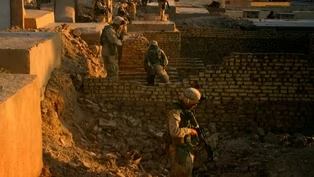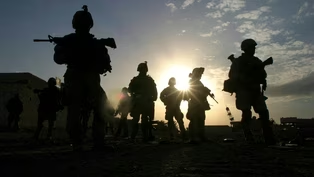
Cpl. Piano's Story
Clip: 11/10/2025 | 3m 35sVideo has Closed Captions
From down-time to go-time, war changes by the moment and is often a matter of millimeters.
From down-time to go-time, war changes by the moment and is often a matter of millimeters. Cpl. Matthew Piano, 2nd Squad Leader of Battalion 3/1, found this out firsthand in a brief exchange with the enemy in Fallujah. As the rest of his squad still leisurely prepared for the battle, he began engaging with a lone gunman in the distance. That day, fortunately, he had an angel watching over him.
Problems playing video? | Closed Captioning Feedback
Problems playing video? | Closed Captioning Feedback

Cpl. Piano's Story
Clip: 11/10/2025 | 3m 35sVideo has Closed Captions
From down-time to go-time, war changes by the moment and is often a matter of millimeters. Cpl. Matthew Piano, 2nd Squad Leader of Battalion 3/1, found this out firsthand in a brief exchange with the enemy in Fallujah. As the rest of his squad still leisurely prepared for the battle, he began engaging with a lone gunman in the distance. That day, fortunately, he had an angel watching over him.
Problems playing video? | Closed Captioning Feedback
How to Watch The Last 600 Meters: The Battles of Najaf and Fallujah
The Last 600 Meters: The Battles of Najaf and Fallujah is available to stream on pbs.org and the free PBS App, available on iPhone, Apple TV, Android TV, Android smartphones, Amazon Fire TV, Amazon Fire Tablet, Roku, Samsung Smart TV, and Vizio.
Buy Now
Providing Support for PBS.org
Learn Moreabout PBS online sponsorship(distant gunfire) CPL.
BENDER: That's kind of how things were.
There's intense moments, and then there's hanging out, you know, and so for that point, I'm trying to switch tapes around and get my camera ready to roll for what's coming next, trying to take advantage of the time that we had, and- and I get my camera slapped- slapped back together, I'm ready to roll, and Piano now is- he's ducking and he's- ducking and dodging bullets, and it's- it's kinda weird, because most of the other Marines were drinking water, and kind of on standby.
We're waiting for word from staff sergeant.
(gunshots) (indistinct chatter) (gunshots) CPL.
SLAWATYCKI: One insurgent popped up and we fired, myself and Corporal Piano fired shots at him, and at this point we had only saw him very briefly, we weren't sure, and I actually asked, I believe I asked Lance Corporal Pancamo, I'm like, "Did I get him?"
Yeah, I wasn't exactly sure at this- at that point, so, he dropped down, and the next thing I remember seeing was a glint of a rifle, and shots were fired.
CPL.
BENDER: 'Brrrrrrrat,' like an AK buzz, you know?
And he just- I can remember it, you know, it was like a freeze frame in my mind, and you see- his Kevlar is like this, and you see, 'thonk!'
and I'm behind him, and I just see this dust 'ptoo!'
like puff out of his Kevlar, and you just get this sick feeling in your stomach, you know?
He- his rifle- he takes it like this, and- you know, you're never supposed to drop your rifle, and even when he gets thumped in the head, and Piano like, takes his rifle and sets it down and like- kind of like lays it on the ground as he's falling.
CPL.
SLAWATYCKI: I stood up and started firing two or three grenades, and also shots in the area, second platoon can confirm that they had found the insurgents, and Corporal Piano was on the ground.
CPL.
BENDER: Thump right through there, the round- the round went in and came out the back of the Kevlar.
So he should have been a goner.
You know, the docs were there with us, and everybody's- we thought he was dead, you know?
We figured we'd pull off his Kevlar and there'd be a mess of brains in there, and he'd be done, you know?
And he walked out of there.
And you know, Tycki will tell you he kept repeating things like, "Tycki, you got the squad," you know, he's- he's trying to- he knows he's gone, he knows he's out of the fight, but he wants- he wants us to be successful.
(gunfire) CPL.
PIANO: What really got to me when I got to the train station, what I was very upset with and like, I still regret it to this day was- I don't know about other wounded Marines but, if you get wounded you feel as if you failed.
You are trained not to get wounded.
It's just a- a failure, you feel like a failure.
I feel I let my Marines down.
CPL.
SLAWATYCKI: Immediately I took over the squad, became squad leader, made Lance Corporal Pancamo my first team leader, and right after that we had left the schoolhouse, and began to push south again, as if nothing happened.
But we- it was- the mindset changed.
He was the first one in our squad to get seriously wounded, and the mindset changed immediately.
And from then on out, I'll have to say, honestly, in my personal opinion, it wasn't just- just another battle that you happen to be in that you train for, it definitely became a personal situation, for myself, because that was bad day for the whole company and the battalion, we lost a lot of guys that day.
Video has Closed Captions
Clip: 11/10/2025 | 3m 38s | August 2004, U.S. forces engage with a Shiite militia in the Southern Iraqi city of Najaf. (3m 38s)
Video has Closed Captions
Preview: 11/10/2025 | 30s | The deadliest battles of the Iraq War are revealed in the words and deeds of those who fought there. (30s)
Providing Support for PBS.org
Learn Moreabout PBS online sponsorshipSupport for PBS provided by:

















